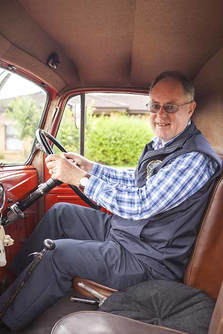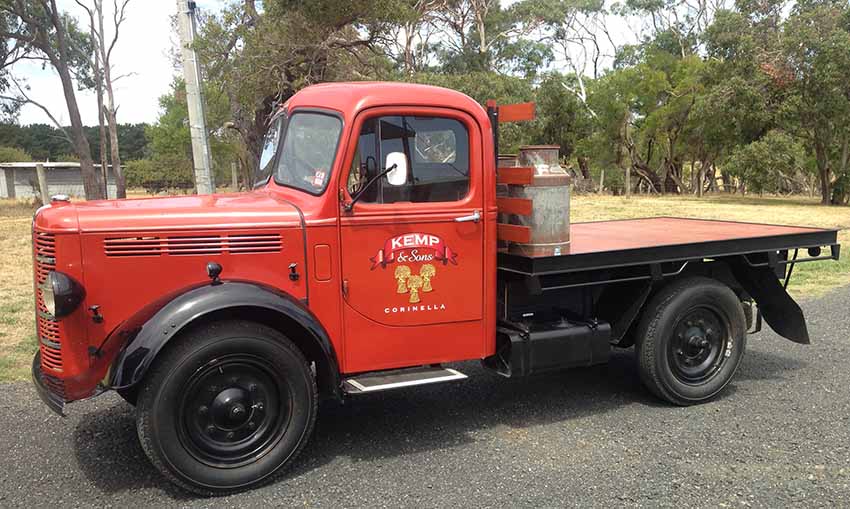
DAVID Kemp likes to share a journey. Last December he gave Santa a lift into Corinella in his big red truck, a 70-year-old Bedford. Since then David has been ticking off milestones on a path few others will travel.
Six years ago David visited his doctor after a fall. There was also an occasional hand tremor. Referred to a neurologist, his symptoms informed a diagnosis of Parkinson’s disease. An MRI scan proved that no other neurological conditions existed. He was then prescribed medication to reduce the symptoms.
“It was good to have a label,” recalls David, “though the medication could not provide a cure. At least the symptoms could be managed.” David rejected a “poor me” attitude and chose not to let Parkinson’s force him to withdraw from life. With near missionary zeal he undertook to increase understanding of the disease and encourage others with the same condition.
No one yet can tell how people acquire Parkinson’s disease. It isn’t hereditary, it isn’t contagious and isn’t caused by the environment. The symptoms result from reduced production of dopamine which is used within the brain to send signals that cause muscles to move.
Dopamine is produced by nerve cells called neurons, in the basal ganglia, the middle of the brain. With Parkinson’s, the neurons gradually break down, reducing the level of dopamine, resulting in abnormal brain activity. This means that people have difficulty controlling their movements or moving freely.
“It has no real impact on life expectancy. One dies with it, not from it,” says David, “This is my journey with Parkinson’s.” There are review consultations every three months. It is a somewhat trial and error process to get the medications and the dosages right. Though the levels have been progressively increased, by mid-2017 the fatigue, lack of sleep, leg cramps, right side tremors, reduced fine motor control and reduced walking control meant David was struggling to maintain a healthy lifestyle.
He says his wife, Ruth, and the family have been tremendously supportive. He is thankful to God for boundless blessings as he remains an active member of the community. He is driven by his Christian faith, his personal mission and the satisfaction he gets when folk share their journeys with him. Christmas was a good time to reflect on such things and prepare for the year ahead.
Three weeks after giving Santa that lift, David visited the team at Malvern Neurology at Cabrini Hospital Medical Centre to test his suitability for a procedure that will change his life. The assessment included consideration of David’s physical condition and his psychological resilience.
Not everyone could gleefully consider having brain surgery under local anaesthetic, let alone advise the neurosurgeon as he guides electrodes deep into the middle of their brain but David’s enthusiasm was overwhelming.
He talks about deep brain stimulation (DBS) the way most people talk about an overseas holiday. DBS tricks the brain into thinking that dopamine is being released. Once the electrodes are in place, the operation includes implanting a pacemaker into David’s chest under a general anaesthetic. This is linked to the electrodes through fine wires under the skin. The entire process takes three to four hours. Once in place the pacemaker will send electrical current to specific regions of David’s brain.
The hospital stay is around seven days though the recovery period will be about six weeks. Frequent visits are made during this period to adjust the electric stimulation and adapt medication to the changes in symptoms.
Although not common, DBS is far from experimental, having first been trialled nearly two decades ago. One of David’s friends, Peter Raymond, underwent the same procedure in 2014, resulting in a very successful outcome. His operation was televised by the ABC’s 7.30 Report. He still has PD and leads a normal life.
Crunch time for David came when he received the news that he was suitable for BDS. On January 9, he sat with Ruth and they made the decision to go ahead. It’s her journey too, after all.
There are some serious risks to consider, including brain damage. Mood or behaviour might be affected and there are other potential side effects. “The risks are significant but it’s reassuring to be in top surgical hands,” David says. He is using the same team as Peter Raymond and is confidently looking forward to the benefits of DBS.
During the recovery phase he won’t be permitted to drive. He won’t be capable of making major decisions until the stimulation and medication adjustments restore order. “I told the family that I may be grumpy when I’m not allowed to drive the red truck.”
“We won’t notice any difference, Dad!” one of his children replied.
Surgery is scheduled for March 21 at Cabrini.
Is he hesitant? “Bring it on!” he says, “I look forward to our next conversation in the truck.”
Parkinson's Victoria: http://www.parkinsonsvic.org.au/
